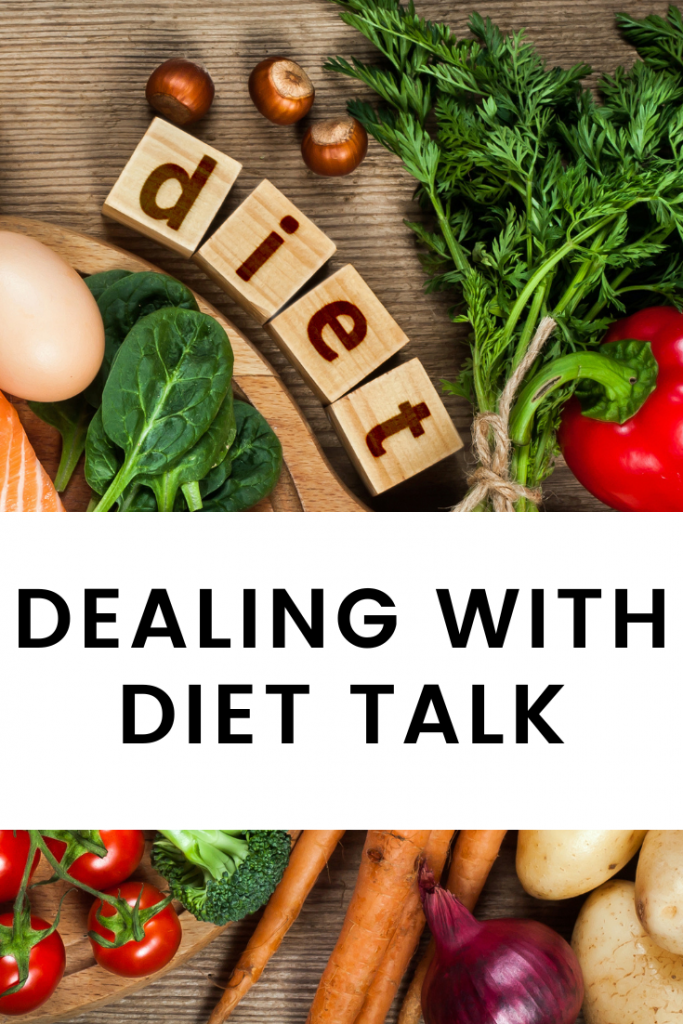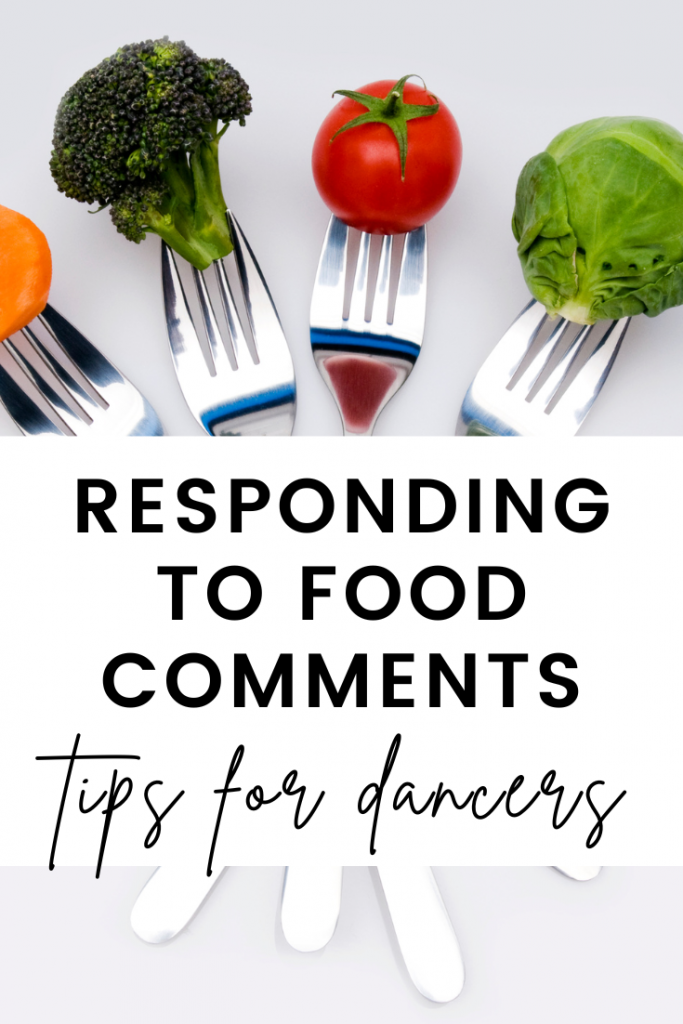Hi Rachel! I have a family member who won’t stop making comments and jokes about diet and food. I told her to stop, but she believes I’m being too sensitive. How should I respond?
If this sounds familiar, you’re not alone. Whether you’re just starting to explore intuitive eating or already deep in the work of dismantling diet culture, diet talk is everywhere, especially in dance spaces, social circles, and family gatherings.
Here’s the truth: as you build confidence in a non-restrictive and intuitive approach to food, you’ll inevitably spark confusion or even criticism. That’s not a reflection of your progress; it’s a reflection of a multi-trillion-dollar industry that profits from body dissatisfaction.
Let’s look at how you can confidently navigate these conversations without losing your peace.
The Reality of Diet Talk in Dancer Culture
Picture this: You’re enjoying a sundae after rehearsal because it’s what feels good in the moment. A family member comments, “Wow, I could never eat that and stay in shape.”
Or you’re eating fruit for dessert, and suddenly everyone praises you for being “so healthy.”
Both comments come from the same place: a culture that moralizes food and ties a dancer’s worth to appearance. You can’t control or prevent every instance of diet talk, but you can equip yourself with tools to protect your mindset.
This guide will walk you through five key steps to respond to diet talk with confidence and compassion, plus practical scripts you can use in real-life scenarios.
5 Steps To Respond To Diet talk
#1: Acknowledge Your Awareness
If you’re reading this, you’ve already taken a critical step: recognizing that diet talk is harmful. This awareness is foundational in The Healthy Dancer® framework. You’re actively unlearning years of messaging that equate discipline with restriction and worth with body size.
Be proud of that awareness, but stay curious. Keep strengthening your filter for spotting diet culture in disguise. Follow credible, non-diet professionals and intuitive eating experts who reinforce supportive, evidence-based perspectives. The more you expose yourself to those messages, the easier it becomes to recognize and reject harmful ones.
#2: Shift Your Self-Talk
Before you respond outwardly, check your internal dialogue. Even as you move away from dieting, old thoughts can resurface: “Should I really eat that?” or “Maybe I should try what she’s doing…” No matter how long you’ve been working on building a supportive relationship with food, even just a few months of dieting exposure can make it hard to fully dissociate.
These moments don’t mean you’ve failed; they’re reminders of how deeply diet culture is ingrained. Use compassionate curiosity to notice these thoughts without judgment:
- When do they show up? Do patterns exist?
- What triggers them?
- What emotions follow?
Then, ground yourself in facts. Restriction doesn’t improve health or performance. It fuels guilt, obsession, and fatigue. Revisit evidence-based truths like:
- The truth about sugar
- The truth about fat
- Are processed foods the enemy?
- Why eating “clean” may not be the best goal.
The more you reinforce this understanding internally, the easier it becomes to challenge external diet talk.
#3: Empathize, But With Boundaries
It’s not always easy to refrain from diet talk, especially if topics of weight and health feel important and necessary.
Diet talk doesn’t always stem from malice, but rather, from fear (of weight gain or sickness) or a desire for control. Recognizing that can help you stay grounded, but it doesn’t mean you must engage. You can respond with empathy and maintain clear boundaries:
“I know you care about health and want what’s best for me. I’m actually working to build a more supportive relationship with food, so I’d rather not discuss diets right now.”
Expect to repeat this boundary— reminding others is part of the process. Persistence reinforces your values. Here is another article to learn more about setting boundaries.
If your immediate circle isn’t supportive, seek community elsewhere. The Healthy Dancer® community exists for exactly this reason: to help you surround yourself with others committed to healing from dancer diet culture.
#4: Decide If It’s Worth Your Energy
Some days, you’ll feel ready to educate and advocate. Other days, you just don’t have it in you— and that’s okay. You’re prioritizing your energy. If a conversation feels draining or triggering, you can:
- Change the subject: “Speaking of trends, have you seen that new series on Netflix?”
- Set a boundary: This can be tough in family settings, but it’s worth a try. “I’m working to feel confident in my body as it is. I’d appreciate leaving body or food comments out of our chats.” Another option: “I know that was intended as a compliment, but I feel uncomfortable with people judging my body,” and “I’m learning to feel confident in my body just as it is. Your comments aren’t helpful.”
- Opt out with honesty: “Diet talk is everywhere. I’d love to talk about something more energizing!” Or, “I’d prefer if you didn’t make comments about my food choices or body. Thanks!”
- Exit the situation: Step away for air, grab water, or check your phone. Self-care comes first.
Remember: protecting your peace is a form of progress.
#5: Take A Social Break
Social media algorithms thrive on diet content; even “anti-diet” posts can spiral into diet-y messaging. We know that social media is harming our health. Facebook and Twitter, along with YouTube, are some of the biggest platforms known to perpetuate weight bias. Instagram’s algorithm may also lay the groundwork for disordered eating and poor body image.
Try these digital boundaries:
- Unfollow or mute accounts that trigger guilt or comparison.
- Follow creators who focus on body respect, performance, and joy instead of aesthetics.
- Take short breaks when content feels overwhelming.
A clearer feed = a clearer mind.
#6: Respond (If You’re Ready)
The journey towards building a sustainable lifestyle makes you the expert on your body and your mind. If you feel up to it, explain your decisions. You can even explain what a non-diet approach looks like and refer them to professional resources. Here are a few examples:
- I’m learning how to make food choices that best serve my body. I choose foods that nourish and energize my body. I also choose foods based on how I’m feeling and what I’m craving at the moment.
- I’m learning how to build confidence around all foods, from desserts to veggies. The point is to make choices that fuel me and satisfy me while listening to my internal cues of hunger and fullness. It’s intriguing, you should try it!
- I’m eating an amount of food that feels good for me. It’s taken some work to get to this point, but I highly encourage you to try it!
#7: Get Support
If diet talk dominates your studio or social circle, professional and peer support can make all the difference.
The Healthy Dancer® offers evidence-based resources and guidance to help you strengthen your non-diet mindset. Between the blog, podcast, and masterclasses, you’ll find tools to sustain your progress and connect with others doing the same work.
Scenario Toolkit: Real Responses to Diet Talk
When you’re caught off guard, it helps to have a few lines ready. These responses help you redirect with confidence while keeping your boundaries intact. But remember: changing others’ views isn’t always easy, nor is it your job, but planting the seed might be all it takes.
Food and Diet Comments
Comment: “I’m so bad! I ate too much junk today.”
Response: “You’re not bad! Food doesn’t define morality. It’s all about what helps you feel nourished and satisfied.”
Comment: “Oh, you’re a dancer! You must eat so healthfully.”
Response: “I eat in ways that help me feel energized… sometimes that’s a salad, sometimes it’s a cookie!”
Comment: I’m so bad. I finished an entire brownie sundae. Do you want to start a juice cleanse with me tomorrow?
Response: “No thanks! I feel best when I eat balanced meals and snacks throughout the day.”
Comment: “I have no willpower. If I ate that, I’d never stop!”
Response: “It helps to know I can enjoy what I want and save the rest for later. It’s made eating so much more relaxed.”
Body Comments
Comment: “You’re so [insert body-related comment]. I’m jealous!”
Response: “I’d prefer not to discuss bodies… thanks for understanding.”
Comment: “Looking a little bloated today, huh?”
Response: “Let’s skip the body talk! It doesn’t add much to our day.”
Comment: “The director might expect everyone to slim down before the show.”
Response: “I’m focused on my strength and technique. My abilities as a dancer aren’t defined by my size.”
Key Takeaways: How to Handle Diet Talk as a Dancer
You can’t control other people’s beliefs, but you can protect your peace, preserve your energy, and model a healthier way forward. Remember:
- Awareness is your first line of defense.
- Compassionate curiosity beats self-criticism.
- Boundaries are self-care.
- You don’t have to educate everyone.
- Support and community make this journey sustainable.
You’re not being “too sensitive.” You’re being intentional about your mental and physical health. That’s strength, not fragility! Next steps?
- Explore The Healthy Dancer® blog for more guidance on intuitive eating.
- Join The Healthy Dancer® for ongoing support. Start for free.
- Listen to The Dance Nutritionist® Podcast to keep unlearning diet culture.




